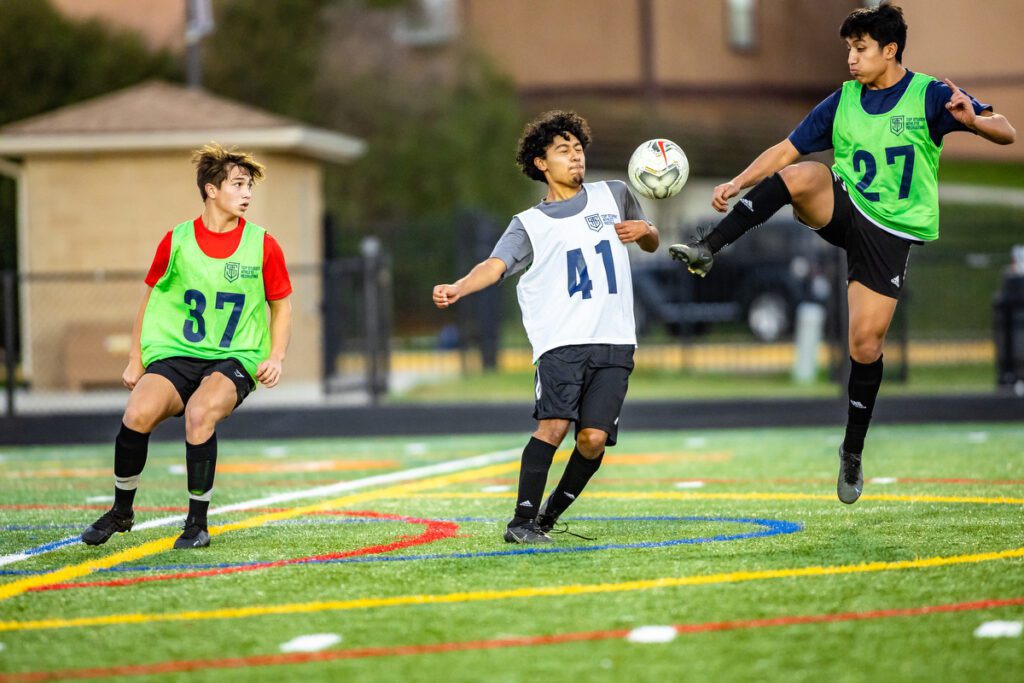Parents are very important to the college recruiting process. In order to maximize your child’s chances of playing in college, you need to understand the role you play in your child’s college recruitment. For this reason, I have detailed the different responsibilities parents have below. I realize every case is different, but with years of experience, this is my best advice.
Communicating with a College Coach as a Parent
Parents are often confused about their role when it comes to communicating with college coaches. As a general rule, communication should be predominantly between the recruit and the coaches at the schools they are considering. Below, I explain the ways in which parents should and shouldn’t communicate with college coaches in more detail.
Face-To-Face: Parents should allow their child and the coach to guide in-person conversations. One major red flag to college coaches is when parents answer questions that were directed to the recruit. Even if you feel you can answer the question better than your child, allow them to be independent and take the lead in the process. However, as long as you take this advice into account, there is nothing wrong with participating in conversations with coaches. I send everyone a “how to talk to college coaches” workbook. It has sample templates for emails and questions a coach may ask your student-athlete and questions your child may want to ask a coach. Whether it is phone calls or face-to-face, I think looking at these questions and thinking about them in advance helps the student-athlete be more prepared. Ask them if they are prepared for a talk. I do encourage, if there is a chance for a face-to-face meeting or a chance for your child to say “hi” to a coach at an event, to encourage them to do so. Kids that can communicate and go out of their way to say hi move up coaches’ lists.
Emails & Phone Calls: Arguably the biggest red flag in many college coaches’ minds is parents who respond to emails or phone calls meant for the recruit. Email and text are the most common form of communication during the recruiting process and, because of coaches’ experience recruiting hundreds of athletes, they can tell when emails are coming from parents as opposed to recruits. It is obviously fine for you to help your child write an email back to a coach, especially if they are nervous to respond or it’s early on in the recruiting process, but the final draft should come from your child and be in their words. Emails from parents pretending to be their kids are easy to spot by an experienced coach. For phone calls/Zoom calls, like face-to-face, I would think about questions to ask and ones they might get asked so they are ready. It is OK for your son/daughter to have a “cheat sheet” when they talk to coaches so they don’t forget.
Regarding emails, I am happy to proofread emails to coaches, etc. Both phone calls and emails get easier as prospects do it more and more, but at the start, this can be helpful. And I am happy to answer questions like, “How do I respond to this text from a coach?”
Parents should ask college coaches any questions they have about their child’s future at the coaches’ schools. After all, you should be looking out for your child’s best interests. However, it is important to not interrupt the communication between your child and the coaches at the schools they are considering. The relationships between your recruit and the coaches recruiting them are what allow your child to make the decision that will be best for their future. When a coach and your student-athlete get to a point in the process and you feel like you don’t know enough of what is going on, I do think it is OK to reach out to the coach in a tactical way that exudes excitement. “Hi Coach, this is Dan and Karen Rothert. We are so excited about your interest in Danny and about your college. I just want you to have our contact information so that if there is anything you want to know about us or if we should be doing anything, don’t hesitate to reach out. This opportunity is important to Danny, and we’re completely supportive. I’d love to learn more about your expectations and where you see things going with Danny. Could we set up a phone call soon? Thank you.”
Some college coaches may like to call the parents to find out more about the prospect and the family, while others may not be interested. If such conversations happen, make sure they only increase your child’s chances with the coach. Don’t just talk about how great your child is, as coaches are more interested in getting more information and selling you on their program so you can help them land your son/daughter.

Setting Up a Visit
I think it is best for your student-athlete to set up a visit with the coach directly. Don’t go through an admissions office. If your child has been asked by a coach to visit, it is pretty easy. If they haven’t been asked yet, it is still OK to ask a coach if the coach has been in communication, or if we are pretty confident we know the level of play is appropriate for your prospect. However, you don’t want to reach out to the coaches at Duke about coming for a visit if your student-athlete isn’t at that level. If you want my thoughts on this for your student-athlete, I am happy to help. My advice is to have your student-athlete set up the visit but copy you on the emails with the coach. That way, the coach sends you the communications/itineraries too. I know how well high schoolers communicate with their parents sometimes, so this can be important. Then, because parents are copied, sometimes if there is a question about the visit, the parents can ask. This is OK as coaches know that the parents are the ones bringing them on the visit.
Things to Keep in Mind
Have faith in your child. As a student-athlete who has the opportunity to continue playing the sport they love in college, your child has already experienced great success. With your support and encouragement, they are capable of taking the lead in the recruiting process. However, you may need to nudge them at times, as this is one of the biggest decisions of their lives. If you have any concerns, worries, or don’t know how to help, feel free to ask me. Every kid is different, and some may need a “kick in the butt” during this process. I may ask for your help there too! It can be nerve-wracking, so sometimes they may shut down. I’ll copy you on emails when I need something from your son or daughter. You can help make sure those things get done. If you’re having any issues or want to know where things are at, don’t hesitate to reach out. It’s true that the ones who do the work have an easier time. I’m happy to talk to parents, independent of their kids or with them, anytime. You can sign up for a meeting with me at the link in my signature or call me.

How to Act at Games & Events
You can support your child during the recruiting process by attending their games consistently and even filming them if you are capable. These days, many games are filmed, and you might see more and more giant tripods with AI cameras (like Veo and Trace) at games. If you are not filming yourself and see a giant tripod with a Veo or Trace camera on it at a game, I encourage you to ask the person with the camera how you can obtain a copy of the game film (exchange emails or phone numbers, etc.). Game film for highlights is crucial for most kids, so exchanging your number and getting an email address from the person filming can prove helpful.
At showcase tournaments, some teams have managers that keep track of college coaches attending their games (they walk around and introduce themselves) and may even hand out team brochures with player contact information. If you don’t have a manager that does this, I encourage you to talk to the other parents and organize one parent to do this. This will help your child know which coaches they need to play in front of and send appropriate follow-ups. It also ensures coaches get the correct contact information for your players (most showcase books are far from accurate or complete, which could lead to missed opportunities). If your club needs help creating a player brochure, let me know, and I can assist you.
Attending ID Camps
Your child will receive countless emails and letters about attending ID camps. It can seem like there are new camps every day, and it’s easy to spend a lot of money without seeing any return. However, attending the right camps can be advantageous in the recruiting process. I’ve created a video about ID camps, which you can watch by clicking here. I’m happy to share my opinions on certain camps and help you determine if they’re worth attending. The summer is full of ID camps, and I’m available to help you map out a schedule and decipher which camps have a good return on investment for your child. It’s important to make sure the camps are at the appropriate level of play for your child and that the right coaches are in attendance. I discuss these and other factors in the video.
I’m here to help, so feel free to share this information with others who may be interested.

